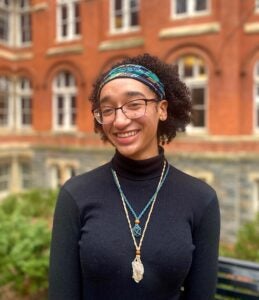Embracing Racial Identity Through Spiritual Practice: A Voyage into the Yogi Path
Yoga has given me a language to rewrite the false histories I clung to about myself. It has given me the space to feel fully who I am and who I want to become. It has brought me to an inspiring spiritual community and given me a new vision of how to live my life. Yoga has allowed me to find myself.
My path to finding a yoga practice has been a slow-to-burn journey peppered with serendipity. In middle school, I came across Pilates workout videos on YouTube. I heard the word “yoga” and “alignment” tossed around by various online creators. I enjoyed the light workouts and their gentle encouragement, content with flute bridges and flutter kicks. As time went on, I discovered more workouts that challenged my mental and physical limits, like cardio kickboxing, leaving the world of Pilates a distant memory in my mind.
Skip a few years forward, and I’m in high school. I struggled to find community and belonging and craved a spiritual practice. I grew up in a non-religious household, with spirituality unnamed by institutionalized religion. I was drawn to a practice that would fill the whole where belonging should have been drawn within my soul. I rediscovered Pilates as a gateway to yoga, following flows from online creators like Sarah Beth. But, something within me still wasn’t satisfied. I wanted more than club meetings and long days in windowless rooms. I wanted to feel alive, to feel a part of a community, and I looked towards a spiritual practice to provide that space.
It was in this mindset I applied to college. Georgetown fit the bill, offering both academics and a myriad of spiritual paths one can explore. Although my first year at the University was virtual, I sought out religious spaces. I found a space for my curiosity within Dharmic Life, catalyzed by Brahmachari Sharan, director of Dharmic Life & Hindu Spiritual Advisor, and Jonathan Makransky, the former Dharmic Life program coordinator. I attended virtual spiritual retreats, learning more about Buddhist and Hindu traditions. With the spiritual guidance of Brahmachari Sharan, I learned that the Yogic path extends far beyond the workouts I found on YouTube. Yoga is an ancient ethics system dating back to India circa 500 B.C.E. that offers folks a way of living spiritually. I began reading Patanjali’s Yoga Sutras daily, enticed by the concise language that inspired new revelations with every reread line. I started to practice yoga outside of the online format I was previously exposed to, thrilled by the connection between breath and movement. I envisioned yoga as a permanent fixture in my future, potentially teaching once my formal career became more financially stable.
It was in this deeper exploration of my Yogic path that I entered the Black Interfaith Fellowship this past year. I applied on a whim, but this program has offered the intentionality I needed to cultivate a meaningful spiritual journey. When I think back to our first group meeting, I am floored by the sense of spiritual community I found. As someone who had largely avoided connecting with their blackness up to this Fellowship, I was met with an unimaginable level of support from both staff advisors and my fellows. It was in this community that I was offered the opportunity to deepen my spiritual journey by committing myself to an ideal I thought was only possible decades from now – teaching yoga. Yoga is meant to offer community, and I, upon coming to Georgetown, was committed to finding a spiritual community. I, however, was struggling to find a spiritual yogic community on my own. Through the guidance and support of Campus Ministry, I found a Black yoga studio, and everything came into place. I received full funding for this venture, a spiritual journey I would not have otherwise been able to afford. I found the deeper meaning I had been searching for upon my first day of training. I found yoga. I found other spiritual Black women. I found bits of myself through them, and them through me. We created a community throughout this 40-hour yoga training, and I cannot be more grateful.
The community I had longed for and committed myself to find at Georgetown finally manifested itself. It has been a long journey to reach this point, but, because of the support I have received from Georgetown’s Campus Ministry and wonderful staff (shoutout to Rev. G), I am on the path of reclaiming and redefining my relationship with my spiritual self, and also with my blackness. Community comes in surprising spaces, and I am exceptionally grateful to say I am now finding myself embraced by a loving and supportive spiritual community.
I am now looking forward to teaching Black and Dharmic yoga classes at Georgetown’s Main Campus and Law Center for those moving towards healing their relationship with their identities, spiritual and racial alike through somatic tools. As a queer woman, I also find many of my practices incorporating aspects of spiritual healing with sexuality, breaking down preconceived notions that I hold about myself and how I relate to others. Yoga is a space I have found to be profoundly helpful in allowing myself to connect and heal my relationship with my identities. I am beyond excited and grateful to share in those spaces of healing alongside others.
By Olivia Henry (C’24)
